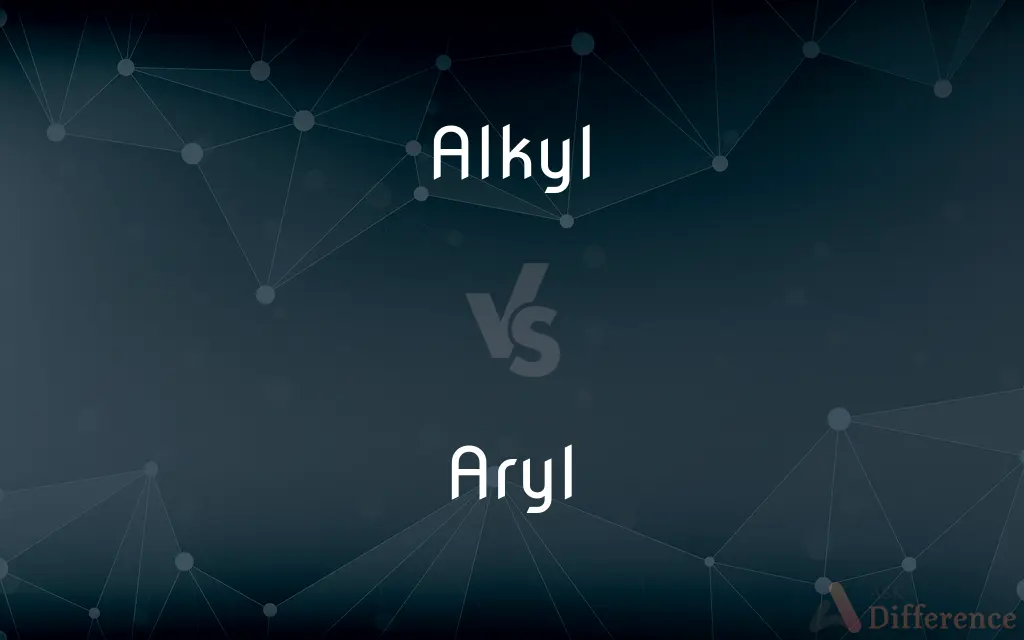Alkyl vs. Aryl — What's the Difference?
Edited by Tayyaba Rehman — By Fiza Rafique — Updated on September 25, 2023
Alkyl is a hydrocarbon group derived from alkanes, missing one hydrogen, and represented as CnH2n+1.Aryl is a hydrocarbon group derived from aromatic compounds, often benzene and denoted as Ar.

Difference Between Alkyl and Aryl
Table of Contents
ADVERTISEMENT
Key Differences
An alkyl group is a functional group in organic chemistry that consists of carbon and hydrogen atoms arranged in a chain. It is derived from alkanes and can be represented by the general formula CnH2n+1. Aryl groups, on the other hand, are derived from aromatic hydrocarbons like benzene and are generally represented by the symbol Ar. Aryl groups contain a benzene ring or some variant of it.
The primary difference between alkyl and aryl groups lies in their structural makeup. Alkyl groups are aliphatic, meaning they are composed of straight or branched chains of carbon atoms. Aryl groups are aromatic, which means they contain a ring structure that adheres to the rules of aromaticity (like benzene).
In terms of reactivity, alkyl groups are generally more reactive than aryl groups due to the lack of resonance stabilization in alkyl compounds. Aryl groups, because of their aromatic nature, are stabilized by resonance and are thus less reactive than alkyl groups. This impacts how these groups react in organic synthesis and chemical reactions.
The usage of the terms also depends on the chemical context. Alkyl groups are often seen in alcohols, ethers, and alkyl halides. Aryl groups are commonly seen in compounds like phenols and aryl halides. Both alkyl and aryl groups serve as the backbone for more complex organic molecules, but their differing structures and reactivities result in different chemical behavior.
Comparison Chart
Structure
Aliphatic (chain-like)
Aromatic (ring-like)
ADVERTISEMENT
General Formula
CnH 2n+1
Ar
Reactivity
Generally more reactive
Generally less reactive
Source
Derived from alkanes
Derived from aromatics
Common Uses
Alcohols, ethers
Phenols, aryl halides
Compare with Definitions
Alkyl
Alkyl groups are aliphatic, composed of carbon and hydrogen.
The alkyl group was attached to the benzene ring.
Aryl
Aryl groups contain a benzene ring or its variants.
The aryl group was substituted at the ortho position.
Alkyl
An alkyl group is a fragment of an alkane missing one hydrogen.
The molecule contains an alkyl chain.
Aryl
Aryl groups are generally less reactive than alkyl groups.
The aryl group was resistant to the reaction conditions.
Alkyl
Alkyl groups can be straight or branched.
Isobutane contains a branched alkyl group.
Aryl
An aryl group is a fragment of an aromatic compound.
The molecule contains an aryl ring.
Alkyl
Alkyl groups are generally more reactive than aryl groups.
The alkyl group easily participated in the reaction.
Aryl
Aryl groups adhere to the rules of aromaticity.
The aryl group in the compound is stabilized by resonance.
Alkyl
In organic chemistry, an alkyl substituent is an alkane missing one hydrogen. The term alkyl is intentionally unspecific to include many possible substitutions.
Aryl
In the context of organic molecules, aryl is any functional group or substituent derived from an aromatic ring, usually an aromatic hydrocarbon, such as phenyl and naphthyl. "Aryl" is used for the sake of abbreviation or generalization, and "Ar" is used as a placeholder for the aryl group in chemical structure diagrams, analogous to “R” used for any organic substituent.
Alkyl
A univalent group, such as ethyl or propyl, having the general formula CnH2n+1.
Aryl
A compound containing benzene or another aromatic hydrocarbon, or a univalent group derived from such a compound by removal of a hydrogen atom attached to the aromatic ring.
Alkyl
(organic chemistry) Any of a series of univalent radicals of the general formula CnH2n+1 derived from aliphatic hydrocarbons.
Aryl
(organic chemistry) Any univalent organic radical derived from an aromatic hydrocarbon by removing a hydrogen atom.
Alkyl
Any of a series of univalent groups of the general formula CnH2n+1 derived from aliphatic hydrocarbons
Common Curiosities
Are alkyl groups aliphatic?
Yes, alkyl groups are aliphatic, meaning they are chain-like.
What is an alkyl group?
An alkyl group is a fragment of an alkane missing one hydrogen.
Do aryl groups follow the rules of aromaticity?
Yes, aryl groups adhere to the rules of aromaticity.
Where are alkyl groups commonly found?
Alkyl groups are commonly found in alcohols and ethers.
Are aryl groups aromatic?
Yes, aryl groups are aromatic and usually contain a benzene ring.
Are aryl groups derived from alkanes?
No, aryl groups are derived from aromatic compounds.
Can alkyl groups be part of cyclic compounds?
Alkyl groups themselves are not cyclic but can be attached to cyclic compounds.
Are aryl groups stabilized by resonance?
Yes, aryl groups are stabilized by resonance.
What is an aryl group?
An aryl group is a fragment of an aromatic compound, often benzene.
Which is more reactive, alkyl or aryl?
Alkyl groups are generally more reactive than aryl groups.
Where are aryl groups commonly found?
Aryl groups are commonly found in phenols and aryl halides.
Do alkyl groups contain benzene rings?
No, alkyl groups do not contain benzene rings.
Can alkyl groups be branched?
Yes, alkyl groups can be straight or branched.
Share Your Discovery

Previous Comparison
Suede vs. Suedette
Next Comparison
Plaintive vs. PlaintiffAuthor Spotlight
Written by
Fiza RafiqueFiza Rafique is a skilled content writer at AskDifference.com, where she meticulously refines and enhances written pieces. Drawing from her vast editorial expertise, Fiza ensures clarity, accuracy, and precision in every article. Passionate about language, she continually seeks to elevate the quality of content for readers worldwide.
Edited by
Tayyaba RehmanTayyaba Rehman is a distinguished writer, currently serving as a primary contributor to askdifference.com. As a researcher in semantics and etymology, Tayyaba's passion for the complexity of languages and their distinctions has found a perfect home on the platform. Tayyaba delves into the intricacies of language, distinguishing between commonly confused words and phrases, thereby providing clarity for readers worldwide.














































